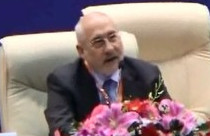
. > RESEARCH > JOURNALISM
Research on Public Opinion through the Perspective of British Mainstream Media on the “Belt and Road” Initiative and the Community of Shared Future for Mankind
Author : Chen Yi, Yan Jing Source : School of Marxism, Jiangsu University 2019-11-18
As a senior member of the club of developed countries, Britain’s mainstream media has an important influence on other countries. Since the community of shared future for mankind and the “Belt and Road” initiative (B&R) were put forward, mainstream media such as The Times, BBC News, The Financial Times, Reuters and The Guardian have given sustained coverage and high attention, which has played an important role in influencing British public opinion and government decision-making. According to more than one year of follow-up research, it can be seen that their attitudes fall into three types: positive, neutral, negative.
Positive evaluation
While the British mainstream media show strong interest in the B&R and the idea of a community of shared future for mankind, some public opinion also holds a more positive and optimistic attitude, mainly focused on the political, economic, social, cultural and ecological dimensions.
The main viewpoints of these five dimensions include the following. First there is a political dimension: in the light of China’s program, economic globalization is irreversible, because mankind belongs to one common community. And international trade and competition are no longer a zero-sum game where one’s gain is another’s loss (Financial Times 18.8.21). With a vision to establish an “international community with shared interests, destiny and responsibility,” the B&R is a Chinese effort to assume more international responsibility (Guardian 16.3.4). Second, there is an economic dimension: supporters have called the B&R a Marshall Plan for the 21st Century, increasing connectivity by helping Asia, Africa and developing countries improve infrastructure (Times 18.8.23). It may also extend to many other countries, which are also keen to link up economically (Financial Times 19.4.2). Third, there is a social dimension: the B&R is likely to provide opportunities for law firms to create lucrative margins (Financial Times 19.3.3). In addition, Chile’s President, Bachelet, forecasts that the initiative is “paving the way for a more inclusive, equitable, just and prosperous society and its development” (Guardian 17.3.14). Fourth, there is a cultural dimension: the B&R is part of China’s strategic development and encourages international cooperation, especially in education (BBC News 18.10.7). Furthermore, Chinese culture and language will help Kazakhstan develop into a more mature and powerful economy (BBC News 17.6.23). Fifth, there is an ecological dimension: China’s positive commitment to curb emissions is part of the Paris climate deal, without which the world would not be able to cope with climate change (Guardian 18.10.5). Meanwhile, the green investment principles of B&R projects, show that the B&R emphasizes low-carbon and climate-adaptive investment and point out that debt sustainability and green sustainability will enhance the sustainability of the B&R (Reuters 19.4.26).
The objective reports and positive comments of the British mainstream media on the thought of a community of shared future for mankind and the B&R are helpful in curbing untrue public opinion and offering guidance, which is also a friendly and positive dissemination of China’s plans and practices.
Neutral evaluation
Some reports in the British mainstream media have taken a neutral attitude towards the community of shared future for mankind and the B&R. Some reports and comments have raised questions while recognizing the benefits of the B&R, including motivation, behavior and influence.
The main opinion here includes the following. First, it considers motivation: some analysts have questioned the commercial feasibility of choosing silk road trains over cheaper sea routes and faster airlift to Europe. They believe that the deeper problems remain the motivation for this initiative (Times 17.5.15). Many developing countries have deep-rooted doubts about the B&R, and some suspect that Beijing is using its “win-win” program as a strategy to attract less powerful countries into its economic trajectory and boost its geopolitical power (Guardian 17.5.14). Second, it considers behavior: there are still many questions about whether China's thinking and the B&R can be realized, regarding “a community of shared future for mankind” to be just a meaningless slogan (Financial Times 18.8.6). China’s construction speed is indeed good news for Asia, where infrastructure has been flawed for a long time, but it is too early to judge whether Xi Jinping’s lofty dream will come true. Some projects are just beginning (Times 18.1.31). Third, it considers influence: China’s B&R is a double-edged sword (BBC News 17.6.26). B&R projects offer clear economic opportunities, but the resulting diplomatic relations are likely to change the current world order (BBC News 17.6.26).
The neutral attitude toward the idea of a community of shared future for mankind and the B&R indicates that the British mainstream media has doubts about China’s solution and practice, which suggests a need for further interpretation and dissemination of the real meaning of the solution and the practice.
Negative evaluation
The negative attitude of the British mainstream media the idea toward the thought of a community of shared future for mankind is not obvious, but there are many obvious negative reports and comments on the B&R, which mainly focus on the perspectives of politics and strategic influence, debt and finance, diplomacy and military, and ecology and the environment.
The negative attitude includes the following perspectives. First is the politics and strategic influence perspective: many observers believe the B&R has a clear geopolitical agenda (BBC News 17.5.12). The B&R has been seen by critics as part of China’s plan to increase its global influence (BBC News 18.10.22), including its political and strategic influence (BBC News 18.7.31). Second is the debt and finance perspective: Critics of the B&R project have accused it of being a kind of “debt colonialism,” providing poorer countries with a line of credit they cannot pay and then extracting strategic land leases or franchises (Times 18.10.10). Some sceptics in the United States see the B&R as a trick to boost China’s own economy by shifting excess industrial capacity to less developed countries (Guardian 17.5.15). Third is the diplomacy and military perspective: the B&R is a state-backed activity aimed at promoting China's global reach, expanding its scale while providing a stimulus for its own economic slowdown. China’s economic slowdown over the past two or three years has coincided with continued overseas expansion (Guardian 19.1.5). What worries countries like Australia and the US most is that Beijing’s ultimate goal is to establish a permanent military base somewhere in the Pacific Ocean within the next two or three decades (BBC News 18.12.16). Fourth is the ecology and environment perspective: the head of the International Monetary Fund has also warned China not to damage the environment through unsustainable overseas investment. There are also concerns about corruption and the impact of some projects on the environment (Guardian 19.4.26). China has been criticized that its overseas coal-fired power projects do not meet emission standards (Reuters 19.7.30).
The negative reports and comments of the British mainstream media on the idea of the community of shared future for mankind and the B&R have been tossed around. Britain's mainstream media does not represent the entire public opinion abroad. However, in view of the mainstream media’s ability to shape public opinion and set policy agendas, its reporting preference and orientation should be given attention.
Brief analysis
It can be seen that different reports and comments in the same media have some negative views on the realistic feasibility of the idea of a community of shared future for mankind, and they impose anxiety on the psychology influencing the practical and actual effect of the B&R. However, some reports and comments look forward to the community of shared future for mankind, which is conducive to writing against economic and ecological crises and to calling on the countries where these opinions exist to actively participate in the process of the building a community of shared future for mankind and the B&R. Some reports and comments are neutral. While confirming the B&R, they also raise their own anxiety and questions, or they are skeptical about the issues related to the initiative. This difference, in addition to differences in values, ideas and interests, is also influenced by the internal differentiation of diverse Western social thought, such as neo-liberal institutionalism, new realism and constructivism, a fragmentation that inspires us in the implementation of this thinking and this initiative. We should pay more attention to changes in contemporary Western social thought, actively seek the common interests of all countries, counter lies and hostile rumors, construct a discourse system that connects China and the world, urge the governments and peoples of all countries to reach a broad consensus, unite to the greatest extent, and create a better shared future for mankind.
Chen Yi and Yan Jing are from the School of Marxism, Jiangsu University.
Interview with Wang Gungwu on significance of studying overseas Chinese
Wang Gungwu is a distinguished Australian historian who studies overseas Chinese. He currently works at the Faculty o...
-
On the rat/mouse of the zodiac
2020-02-20
-
Regional development calls for Huaihe culture’s soft power
2020-01-10
-
Archaeological discoveries unveil Maritime Silk Road
2020-01-06
-
China’s industrial art printing
2019-12-10
-
Yue-Gan Ancient Road: A journey into Hakka history
2019-05-13
-
The Lantern Festival in Dream of the Red Chamber
2019-02-18













 2011-2013 by www.cssn.cn. All Rights Reserved
2011-2013 by www.cssn.cn. All Rights Reserved